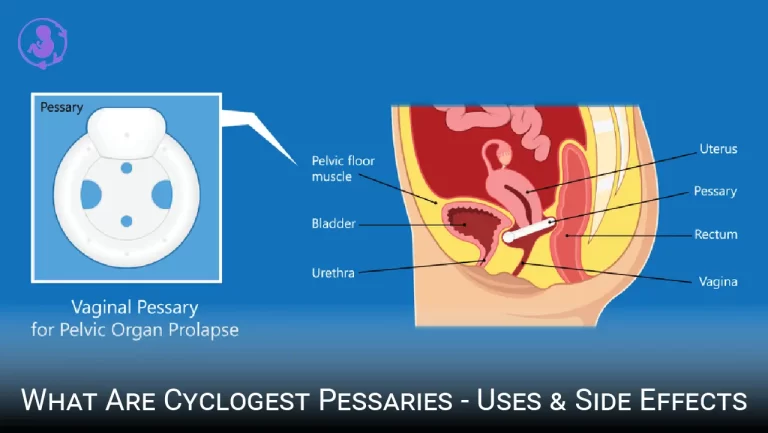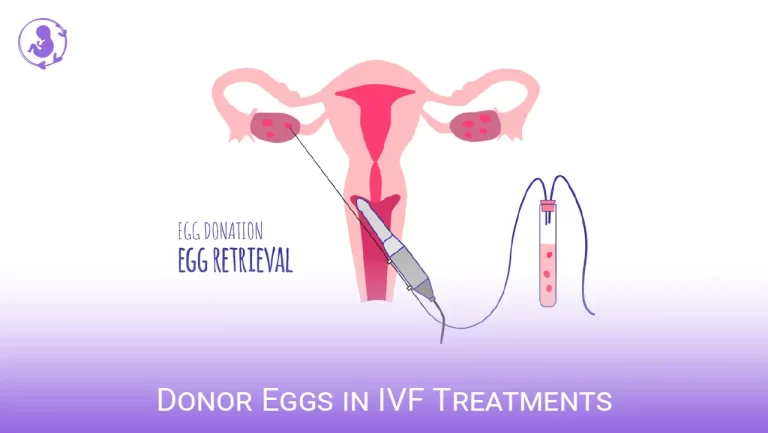IVF Diet Meal Plan – Food for Boost Fertility Diet for Women
Discover how your diet and lifestyle choices can impact your fertility and learn practical tips to boost your chances of getting pregnant.
In this article, we will explore the importance of consuming antioxidants like folate and zinc, incorporating fruits, vegetables, nuts, and grains into your diet, and managing your carbohydrate intake.
We will also discuss the effects of meal timing, harmful fats, protein sources, dairy products, and lifestyle factors on fertility.
Don’t miss out on valuable information that could help you on your journey to parenthood.
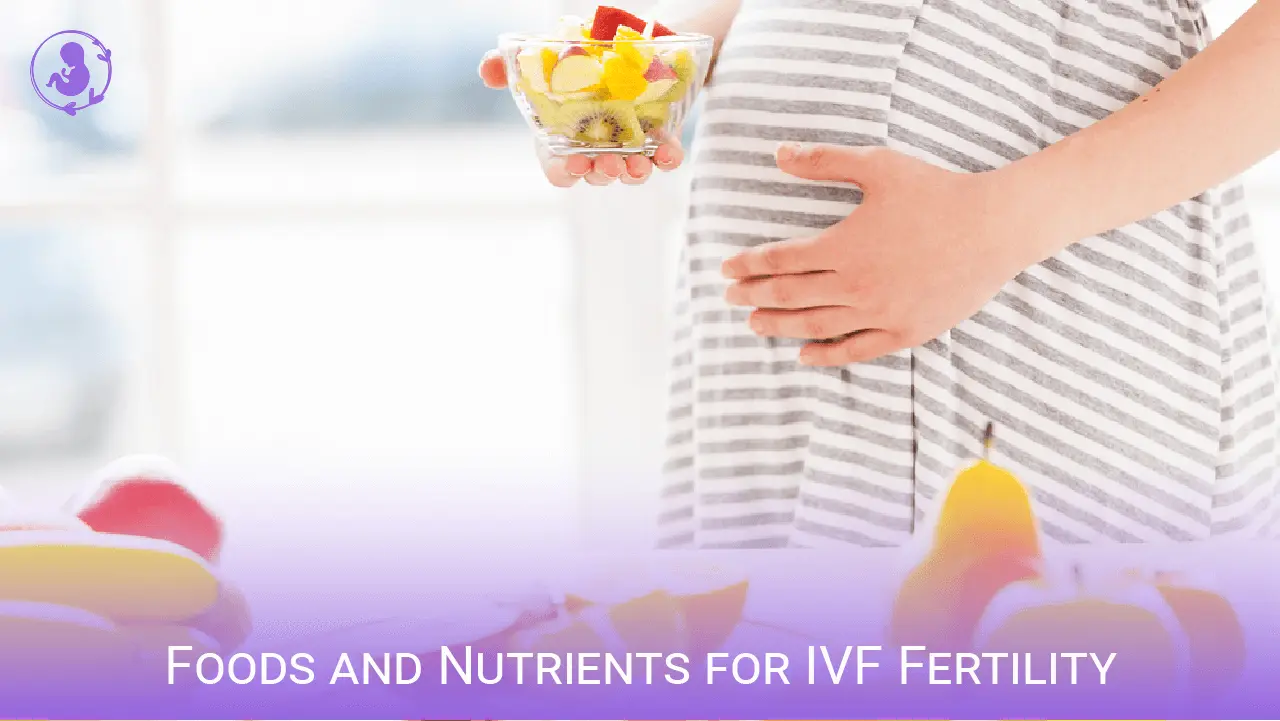
Foods and Nutrients for IVF Fertility
Are you looking to improve your fertility?
In this discussion, we will explore three key points that can have a significant impact: antioxidants and fertility, meal timing and hormones, and the harmful effects of fats on infertility.
By incorporating antioxidant-rich foods, adjusting your meal timing, and avoiding harmful fats, you can potentially enhance your fertility and increase your chances of conception. Healthy food is also a very important factor for the continuous growth of your baby. You can track your child’s growth using the IVF Due Date Calculator.
Let’s dive into these topics and discover how they can positively influence your fertility journey.
Antioxidants and Fertility
Consuming antioxidant-rich foods can potentially boost your fertility and improve your chances of getting pregnant. If you’re trying to conceive, incorporating these foods into your diet can be beneficial.
Antioxidants, such as folic acid, play a crucial role in fertility and can support ovulation and reproductive health. They can be found in a variety of fruits, vegetables, nuts, and grains. Additionally, antioxidants can help combat the effects of conditions like PCOS, which can contribute to infertility.
Meal Timing and Hormones
Adjusting your meal timing can have a positive impact on your hormone levels and potentially improve your chances of conceiving. Here are some ways meal timing can boost fertility:
- Incorporate a fertility diet into your meal plan, focusing on foods that are rich in antioxidants and essential nutrients.
- Follow an IVF diet meal plan that includes a balance of carbohydrates, proteins, and healthy fats.
Consider adjusting your meal timing by:
- Eating a larger breakfast and reducing the size of your evening meal. This can help regulate insulin levels and reduce the risk of infertility.
Be mindful of the types of fats you consume:
- Avoid trans fats and opt for healthy fats like olive oil.
Harmful Fats and Infertility
Replacing unhealthy fats with healthier options, like olive oil, may improve your chances of conceiving and reduce the risk of infertility. A diet high in unhealthy fats can negatively affect fertility and be a cause of infertility.
It is important to incorporate a healthy diet and choose foods that promote female fertility. Opt for foods that are low in trans fats and high in unsaturated fats, such as olive oil, avocados, and nuts. These healthier fat options can increase fertility and support overall reproductive health.
Make sure to include them in your dietary choices to provide proper nutrition for women and increase your chances of conceiving.
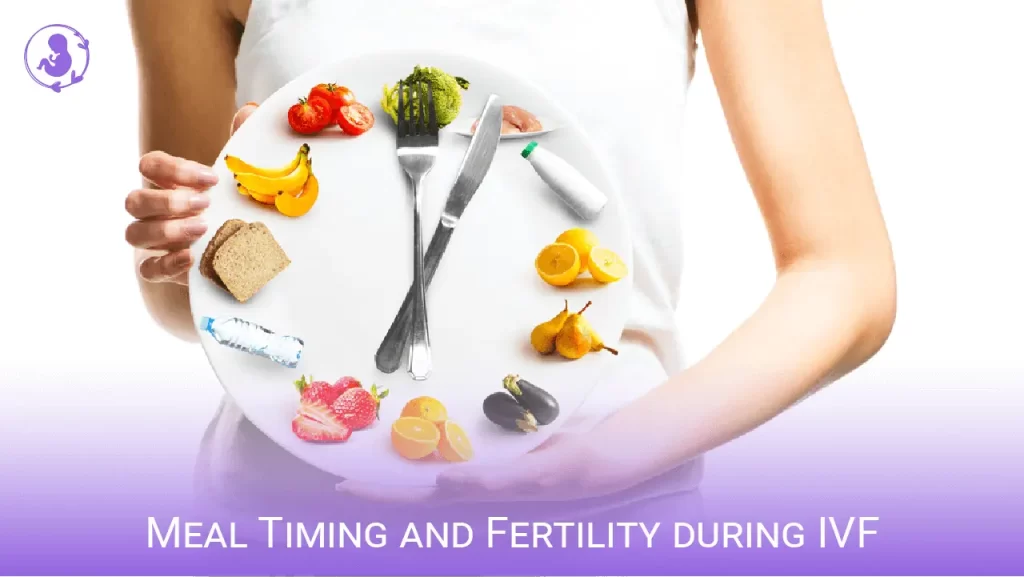
Meal Timing and Fertility during IVF
When it comes to optimizing meal timing for fertility, it’s important to consider the impact on hormonal levels and its relationship with fertility.
By adjusting your meal timing, you can potentially improve hormonal effects, such as reducing insulin levels and testosterone levels in women with conditions like polycystic ovary syndrome (PCOS), a major cause of infertility.
Additionally, studies have shown that eating a larger breakfast and reducing calorie intake in the evening may increase ovulation and improve fertility outcomes.
Optimal Meal Timing
To improve your fertility levels, try eating a larger breakfast and reducing your evening meal size. This can have a positive effect on your chances of getting pregnant and planning a pregnancy.
Here are some tips to optimize your meal timing for improved fertility:
- Start your day with a nutritious and substantial breakfast. Include whole grains, fruits, and vegetables to provide essential nutrients for your ovary health and improve fertility.
- Eat a lighter dinner and avoid consuming large amounts of food close to bedtime. This can help regulate insulin levels and reduce the risk of infertility.
- Consider spacing out your meals throughout the day to maintain steady energy levels and support hormonal balance.
- Listen to your body and eat when you’re hungry, but try to avoid overeating, as excessive weight gain can negatively impact fertility.
Impact on Hormonal Levels
If you’re looking to regulate your hormonal levels, try adjusting your meal timing and focusing on a nutritious breakfast. A balanced fertility diet, combined with regular exercise, can help boost fertility in women trying to become pregnant.
This is especially beneficial for women with polycystic ovary syndrome (PCOS) or ovulatory infertility. The impact of diet on fertility cannot be underestimated, as it plays a crucial role in hormonal balance.
By following an IVF diet meal plan and incorporating fertility-boosting foods, you can support your reproductive health and increase your chances of conception. It is important to note that assisted reproductive technologies, such as IVF, can also be influenced by diet and lifestyle factors.
Relationship With Fertility
Adjusting your lifestyle habits, such as managing stress levels and engaging in regular moderate physical activity, can have a positive impact on your relationship with fertility. Here are some key points to consider:
- Following a fertility diet or an IVF diet meal plan can help boost fertility and improve your chances of conception.
- The Mediterranean diet, rich in fruits, vegetables, whole grains, and healthy fats, has been associated with improved fertility outcomes.
- Avoiding a Western-style diet, high in processed foods, sugary drinks, and unhealthy fats, may help prevent ovulatory infertility.
- Maintaining a healthy weight is crucial for fertility, especially for women with polycystic ovary syndrome (PCOS), a common cause of infertility.
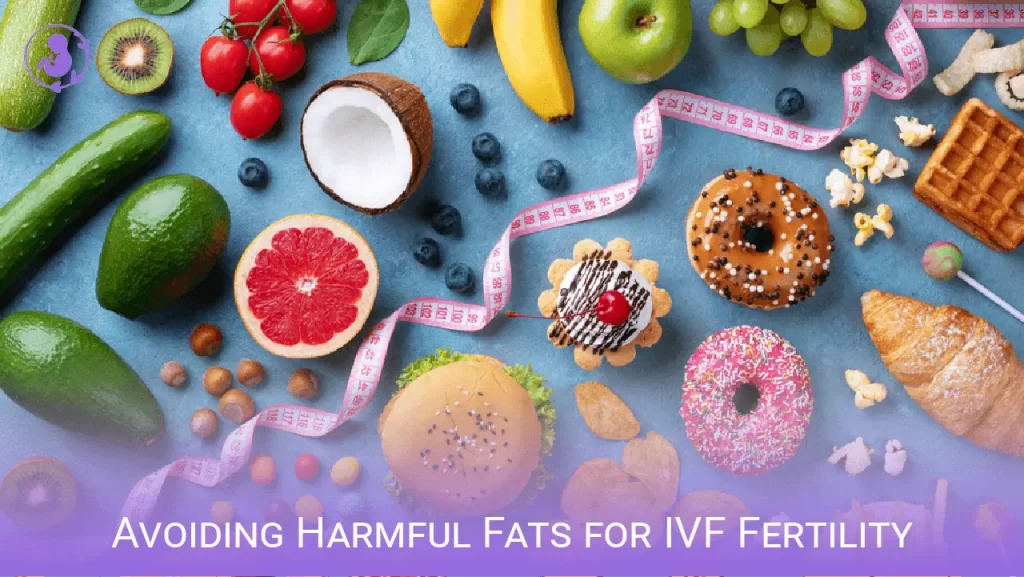
Avoiding Harmful Fats for IVF Fertility
When it comes to fertility, the impact of fats on your diet is crucial. Trans fats, found in hydrogenated vegetable oils and processed foods, have been linked to an increased risk of ovulatory infertility.
On the other hand, incorporating healthy fats, like those found in olive oil and avocados, can promote fertility and make it easier to conceive.
Understanding the role of dietary fats in conception is essential for optimizing your chances of getting pregnant.
Trans Fats and IVF Fertility
Avoiding foods high in trans fats is important for improving fertility and increasing the chances of conception. When trying to get pregnant, it’s crucial to pay attention to your diet and make healthy choices.
Here are some tips to help you make the right food choices:
- Opt for foods rich in healthy fats like olive oil, instead of those high in trans fats.
- Include plenty of fruits, vegetables, nuts, and grains in your meals to boost your intake of beneficial antioxidants.
- Reduce your consumption of refined carbs, such as sugary foods and processed grains, as they can be problematic for fertility.
- Consider incorporating more protein from vegetable sources into your diet, as this may improve fertility in women.
Healthy Fats for IVF Fertility
When it comes to fertility, it’s important to pay attention to the influence of your diet. In the previous subtopic, we discussed how trans fats can negatively affect fertility and increase the risk of infertility. Now, let’s talk about the importance of healthy fats for fertility.
Including healthy fats in your diet may improve your fertility and increase your chances of becoming pregnant. Research suggests that high-fat dairy products, such as whole milk and full-fat yogurt, are recommended for women trying to conceive. These foods have been associated with a decreased risk of infertility.
Moreover, healthy fats like olive oil and avocados are rich in beneficial nutrients that may improve fertility. Incorporating these foods into your diet, along with a balanced meal plan recommended for women undergoing in vitro fertilization (IVF) or other fertility treatments, may improve your chances of becoming pregnant.
Impact of Fats on IVF Fertility
Including healthy fats in your diet can have a positive impact on your chances of getting pregnant and improving reproductive health. Here are some ways in which fats can influence your fertility:
- Making healthy food choices: Opt for foods that are rich in healthy fats, such as avocados, nuts, and olive oil.
- Maintaining a balanced diet: Including a variety of fats in your diet can ensure you’re getting the right nutrients for fertility.
- Avoiding processed foods: Processed foods often contain unhealthy fats that can negatively affect fertility.
- Following a high-fiber diet: High-fiber foods, like fruits and vegetables, can help regulate hormones and improve fertility.
Dietary Fats and Conception
Choosing healthy fats like avocados and nuts can positively impact your chances of conceiving by supporting hormonal balance and reproductive health. A randomized controlled trial found that women of childbearing age who followed a diet rich in healthy fats had a reduced risk of infertility. Making conscious food choices that prioritize healthy fats can enhance fertility for both men and women.
On the other hand, men consuming a western-style diet high in unhealthy fats showed a decreased ability to conceive. This highlights the important link between diet and fertility. By incorporating more avocados and nuts into your diet, you can improve your reproductive health and increase your chances of conception.
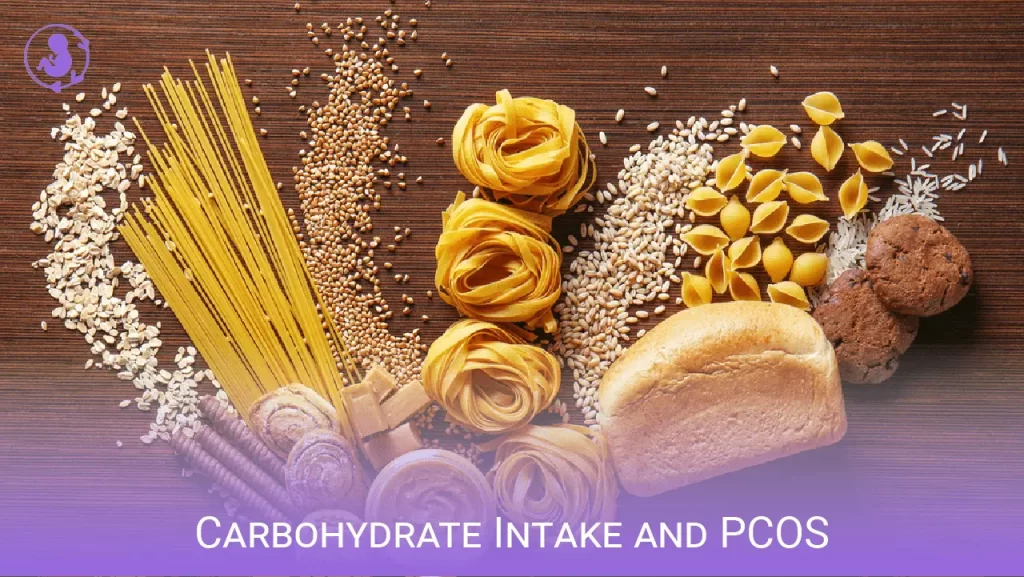
Carbohydrate Intake and PCOS
If you’re looking to improve your menstrual regularity and manage your weight, lowering your intake of refined carbs could be beneficial.
Refined carbs, such as sugary foods, processed grains, white pasta, bread, and rice, can negatively impact fertility.
Lowering Refined Carbs
Reducing the consumption of refined carbs can have a positive impact on fertility outcomes. If you’re a woman trying to become pregnant, it’s important to pay attention to the components of your IVF diet. Here are some reasons why lowering your intake of refined carbs can be beneficial for fertility:
- Refined carbs can contribute to hormonal imbalances, which can disrupt the male and female reproductive systems.
- Women of childbearing age, especially those struggling with infertility or ovulatory issues, may benefit from reducing refined carb intake.
- Refined carbs can increase insulin levels and lead to weight gain, which can negatively affect fertility.
- By replacing refined carbs with fertility-friendly foods like whole grains, fruits, and vegetables, you can improve your chances of getting pregnant.
Impact on Menstrual Regularity
To maintain regular menstrual cycles, it’s important to prioritize a balanced and nutritious diet. What you eat can have a significant impact on your reproductive health, whether you’re trying to conceive or simply want to regulate your periods.
Research has shown that women who consumed a diet rich in fruits, vegetables, whole grains, and lean proteins had improved menstrual regularity and increased chances of getting pregnant. Incorporating foods high in antioxidants, such as berries and leafy greens, can boost semen quality in men.
It’s crucial to follow the IVF diet plan closely and ensure you’re getting an adequate dose of folic acid, as this can also affect your chances of getting pregnant. By nourishing your body with the right nutrients, you can optimize your fertility and increase your chances of conception.
Benefits for Weight Management
Now that you understand the impact of meal timing on fertility, let’s explore the benefits of a varied diet for weight management.
Maintaining a healthy weight is crucial for increasing your chances of getting pregnant naturally. Research has found that women with PCOS, a common cause of infertility, may increase the risk of ovulatory infertility if they are overweight. On the other hand, being underweight can also affect fertility negatively.
By following a balanced and varied IVF diet plan, you can achieve and maintain a healthy weight, which can improve your chances of conceiving. Additionally, there are certain foods that increase fertility and are recommended for women trying to get pregnant. Incorporating these foods into your diet can further enhance your fertility levels.
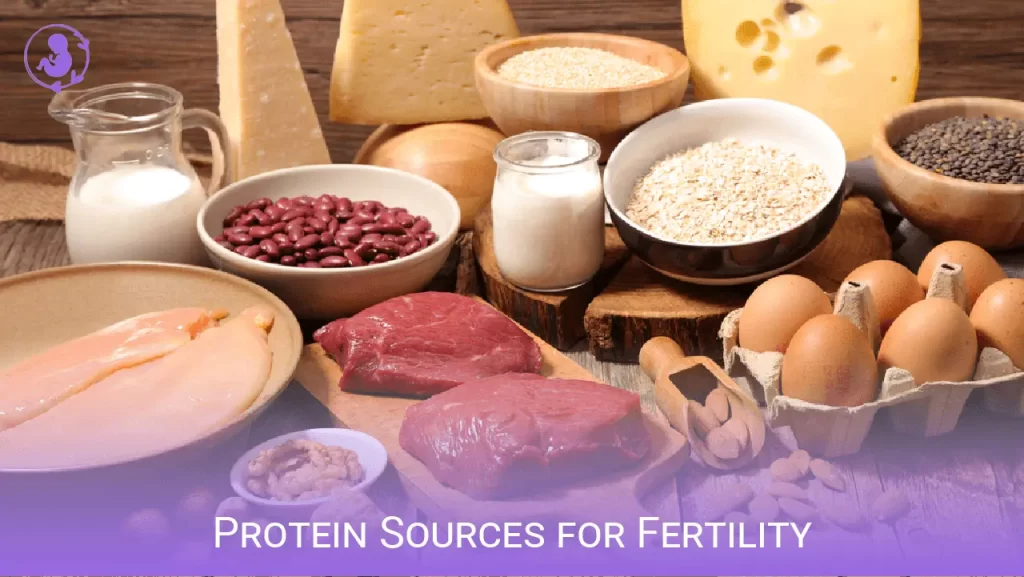
Protein Sources for Fertility
When it comes to fertility, the type of protein you consume can make a difference. Replacing some animal proteins with vegetable protein sources can reduce the risk of infertility by over 50%.
Additionally, increasing your intake of fish has been shown to correlate with a higher probability of live birth following infertility treatment.
Consider incorporating more vegetable proteins and fish into your IVF diet plan for improved fertility outcomes.
Vegetable Vs. Animal Protein
Incorporating more plant-based protein sources into your diet can potentially improve fertility levels. Here are some reasons why you should consider adding vegetable protein to your meals:
- Consuming 5% of total calories from vegetable protein instead of animal protein decreases the risk of ovulatory infertility by over 50%.
- Replacing some animal proteins with vegetable protein sources reduces the risk of infertility.
- Protein from vegetables, beans, lentils, nuts, and low mercury fish can provide essential nutrients for fertility.
- Eating more fish correlates with a higher probability of live birth following infertility treatment.
Fish and Live Birth
Including more fish in your meals can increase your chances of experiencing a live birth after undergoing infertility treatment. Fish, especially low mercury varieties like salmon, trout, and sardines, are rich in omega-3 fatty acids. These fatty acids have been shown to improve fertility outcomes by promoting healthy hormone production, reducing inflammation, and improving egg and sperm quality.
In addition to omega-3 fatty acids, fish is also a great source of high-quality protein. Protein is essential for reproductive health, as it is necessary for the production of hormones and the development of healthy eggs and sperm.
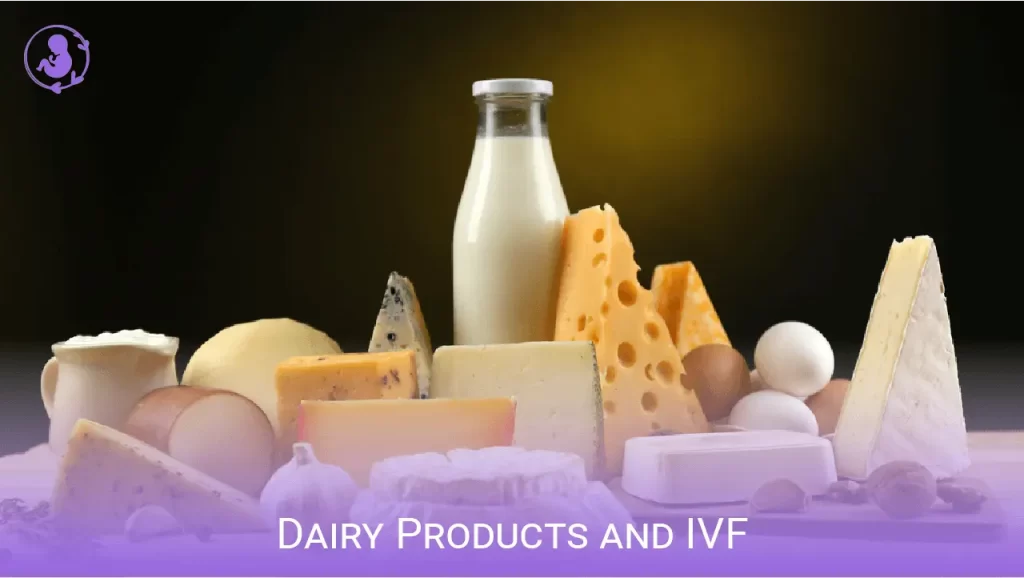
Dairy Products and IVF
Did you know that the type of dairy products you consume can impact your fertility?
High-fat dairy foods have been found to benefit fertility, while low-fat dairy foods may increase the risk of infertility.
Including one or more servings of high-fat dairy, such as whole milk or full-fat yogurt, in your diet can potentially improve your chances of getting pregnant.
Consider replacing low-fat dairy products with their high-fat counterparts for potential fertility benefits.
High-Fat Dairy Benefits Fertility
Opt for high-fat dairy products like whole milk or full-fat yogurt to potentially improve your fertility and increase your chances of getting pregnant. Here’s why:
- High-fat dairy foods, such as whole milk and full-fat yogurt, can reduce the risk of infertility. Consuming one or more servings of high-fat dairy per day can decrease the likelihood of infertility.
- Replacing low-fat dairy servings with high-fat dairy servings can provide potential benefits. Including high-fat dairy in your diet can support fertility outcomes.
Low-Fat Dairy and Infertility
Now let’s talk about the impact of low-fat dairy on fertility.
While high-fat dairy products have been shown to improve fertility and increase the chances of getting pregnant, the story is a bit different for low-fat dairy.
Consuming high amounts of low-fat dairy foods may actually increase the risk of infertility. It’s important to note that the evidence is not conclusive, and more research is needed to fully understand the relationship between low-fat dairy and fertility.
However, if you’re trying to conceive, it may be worth considering replacing low-fat dairy servings with high-fat options, such as whole milk or full-fat yogurt.
As always, it’s best to consult with your healthcare provider for personalized recommendations.
Lifestyle Factors and IVF Diet Meal Plan
Engaging in regular moderate physical activity supports your fertility goals. Here are four lifestyle factors that can impact your fertility:
- Excessive high-intensity exercise can have detrimental effects on your fertility. Finding a balance and engaging in moderate physical activity can be beneficial.
- Increased stress levels decrease your chances of getting pregnant. Hormonal changes due to stress can suppress fertility. Taking time for yourself and seeking support and counseling can reduce anxiety and depression.
- Limiting caffeine intake to one or two cups of coffee per day is recommended. While the association between caffeine and fertility is inconclusive, some studies suggest a longer time to conceive with high caffeine intake.
- Excessive alcohol consumption negatively affects fertility. High alcohol intake is associated with a longer time to conceive. Moderate alcohol consumption’s effect on fertility is mixed.
Take care of your lifestyle factors to improve your fertility outcomes.
Frequently Asked Questions
Conclusion
In conclusion, if you’re looking to boost your fertility, making changes to your diet and lifestyle can have a significant impact.
By incorporating antioxidant-rich foods like fruits, vegetables, nuts, and grains into your meals, you can improve your chances of conceiving.
It’s also important to pay attention to meal timing, avoid harmful fats, manage carbohydrate intake, choose the right protein sources, and consider the impact of dairy products.
Additionally, maintaining a healthy weight and engaging in moderate physical activity can further enhance your fertility.
Remember, small changes can make a big difference in your journey to parenthood.
Read More On IVF



